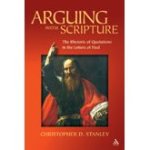Well, with SBL Annual Meeting nearly upon us and my Winter Quarter teaching rapidly approaching I decided it was time to start posting regularly again. I must admit I was a bit surprised to see the length of my last drought; but, alas what is done is done. On to more exciting topics, namely the SBL 2010 Meeting in Atlanta. I will post a few times this week about events I plan to attend but I thought I would start today with some of the Professional Development sessions, many of which are hosted by members of the Student Advisory Council. In the past I have not attended these sessions as there are always many interesting sessions happening simultaneously and I chose others instead. However, this year I have two friends hosting sessions and I’m on the job market so I thought I would take a closer look at these potentially valuable sessions.
S20-314 Finding Your “Niche” in Biblical Scholarship
This session hosted by fellow blogger and UCLA PhD student Pat McCullough looks rather promising for anyone struggling to find a niche in this field growing more saturated by the day. I remember the days when I was trying to find my niche and my feelings of dread the closer I got to working on my dissertation. Pat has put together an all-star panel of established scholars ready to share their wisdom.
S21-212 From Dissertation to Publication: Advice from Editors and Authors
Another friend of mine, Brandon Wason, is hosting this panel which should prove especially useful for individuals like myself nearing the end of the dissertation process.
S21-314 E-Publish or Perish?
This is the professional development session which intrigues me most. Is e-publishing a viable and respectable CV building outlet, something akin to blogging, or somewhere in the middle. I will be at this session listening with great interest.
S22-131 Navigating the Job Market
This is by far the scariest of the professional development sessions. As one on the job market I’m not sure that I’m ready to confirm the harsh realities of the current job market which I have already found out first hand. Since it takes place during my presentation on Monday morning I suppose I will have to hear this information second hand.
Well, those are just a few of the useful professional development sessions being held this year. I highly suggest you head over to the SBL website and view them for yourself. While, listening to world class scholarship is a must make sure you use some of your time at SBL to network and acquire the necessary tools for finding your place in the field, opportunities for publishing, and improve your chances of finding a job when you graduate.


